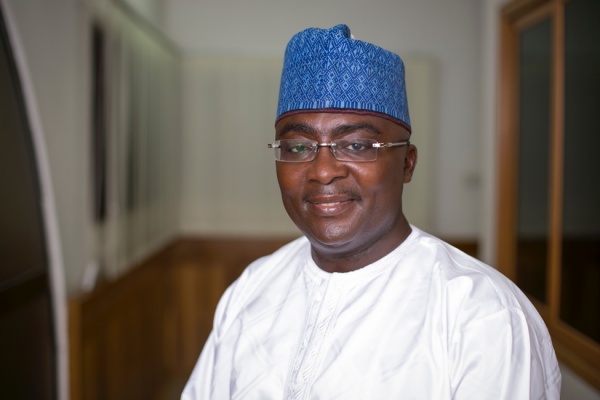The Vice President, Dr. Mahamudu Bawumia says Ghana’s economic fundamentals are still stronger and far better than most countries in the sub-region.
Speaking at an event organized by the Tertiary Education Confederacy (TESCON) of the New Patriotic Party (NPP), in collaboration with the Think-Tank, Danquah Institute on Thursday, April 7, 2022, Dr. Bawumia appealed to the public to examine the real cause of the current economic challenges.
“Let’s examine the economic fundamentals. Are weak fundamentals the reason for our current economic challenges?” he asked rhetorically.
“What is the data saying about key variables like Inflation, interest rates, external sector performance, fiscal balance, debt stock, GDP, and the exchange rate? Our assessment will be based on the evolution of these variables over a period of time, the Vice President continued.
Below are slices from his speech
INFLATION
TABLE 3: INFLATION % IN SELECTED COUNTRIES 2019 AND 202
“Ladies and Gentlemen, countries and economies throughout the world are experiencing severe challenges following the COVID-19 pandemic and the more recent Russia-Ukraine war.
The pandemic, which started in early 2020, resulted in the greatest economic depression in the world since the 1930s with most countries recording negative GDP growth.
Supply chain disruptions and the rising price of oil, which went up to a high of over $130 this year, have resulted in major increases in the prices of fuel across the globe with petrol prices doubling in many countries. The highest petroleum prices can be found in Hong Kong, the Netherlands, Zimbabwe, Germany, Israel, and the United Kingdom.
Price Per Litre of Gasoline (Petrol) on 28th March 2022
Hong Kong – US$2.87, Netherlands – US$2.51, Zimbabwe – US$2.35, Germany – US$2.27, Israel – US$2.25, United Kingdom – US$2.14, and Central African Rep – US$2.01
Source: www.globalpetrolprices.com
Furthermore, the global average cost of shipping a container has increased from $1446 in December 2019 to $9, 789 in February 2022 (an increase of 576%).
This has dramatically increased the cost of shipping goods and therefore their prices on the market.
Food prices have also not been left out. The FAO Global Food Price Index increased from 95.1 at the end of 2019 to 140.7 12 in February 2022 (an increase of 48%).
The increase in commodity prices has been exacerbated by the Russia-Ukraine conflict. Russia and Ukraine together account for 30% of global wheat exports; the longer the conflict ensues, the greater will be the disruption to global food supplies. The conflict is also likely to slow down global growth.
According to the AfDB, the price of wheat has shot up by 62% since the war began, the price of fertilizer is up by 300%, and the price of maize is up by 36%.
Here in Ghana, some 60% of our total imports of iron ore and steel are from Ukraine; Russia accounts for some 30% of Ghana’s imported grains, 50% flour, and 39% of fertilizer.
So we are directly affected by the Russian-Ukraine war. Unfortunately, we do not know when it would be over.
The global increase in fuel prices is causing hardship in even the most advanced economies like the United States 13 of America. (Please watch the video on the screen showing the exasperated reaction of a consumer in the USA to the petrol price increases).
Global inflation is on the rise and many advanced economies like the UK and USA are experiencing their highest inflation rates in 30 and 40 years respectively.
Africa’s largest oil producer, Nigeria, is experiencing fuel shortages, high food prices, and power outages. President Biden has blamed COVID and Russia for the high prices.
Food prices are rising sharply in Algeria and there are shortages. There are protests in Spain over the high fuel, food, and electricity bills. In the UK, consumers are complaining about energy bills, higher taxes, water bills, and higher national insurance, higher broadband charges, and so on. The entire Eurozone is feeling the pinch of rising prices.
COUNTRY 2019 (DEC) 2022 (FEB) Factor of Increase
USA 1.81 7.9 4.3
UK 1.79 6.2 3.4
NIGERIA 11.4 15.7 1.37
COTE D’IVOIRE 0.81 4.6 5.68
GHANA 7.9 15.7 1.98
Indeed, the data (Table 3) shows that in the UK and US for example, inflation is accelerating at three to four times its rate in 2019 (before COVID).
In Cote d’Ïvoire inflation is accelerating at five times its rate before COVID-19. In Nigeria and Ghana, inflation is accelerating at 1.3 to 2 times its rate before COVID-19.
The path of inflation in Ghana has been similar to those of other countries following the COVID pandemic. Inflation had declined from an average of 17.5% in 2016 to an average of 7.2% in 2020.
Since the pandemic, inflation has increased to an average of 10% in 2021. As at February 2022 inflation 15 rose further to 15.7% as a result of global conditions, including a rise in crude oil and other commodity prices and the Russian-Ukraine conflict.
It is important to note that between 2013 and 2016 inflation averaged 15.9%.
Between 2017 and 2021 however, inflation has averaged 10.4% notwithstanding the impact of COVID-19
INTEREST RATES
Before COVID-19, the steady disinflation process provided scope for significant monetary policy easing.
The Bank of Ghana’s Monetary Policy Rate (MPR) was cut by a cumulative 11% between January 2017 and January 2021
Notwithstanding COVID-19, interest rates are lower now than they were in the 2013 -2016 period. In response to the recent increase in inflation, the Bank of Ghana has increased the policy rate by 2.5% from 14.5% to 17.0%.
External Sector Performance:
Ghana’s external payments position strengthened in the 2017-2021 period relative to the 2013-2016 years.
For the first time in over 30 years, the trade balance (the difference between what we export and what we import) recorded a surplus for five successive years (Figure 4).
The trade balance was in the deficit between 2013 and 2016 but moved from a deficit of $1.7 billion in 2016 to a surplus of $1.1 billion in 2017, a larger surplus of $1.8 billion in 2018, and an even larger surplus of $2.2 billion in 2019. T
The impact of 19 COVID-19 has seen a reduction of the surplus to $2.04 billion in 2020 and a further reduction to $1.1 billion in 2021.
Nevertheless, this is still a much stronger performance than the trade deficit of $1.7 billion recorded in 2016 (which was one of the stronger performances in the 2013-2016 period.









































